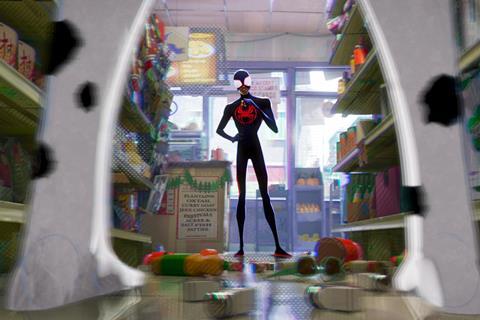
Spider-Man: Across The Spider-Verse returned to the top of the North American box office charts, achieving the rare feat in its fourth weekend as it soared past $300m.
The Columbia Pictures and Sony Pictures Animation tentpole dropped 28.5% and added $19.3m from 3,785 theatres to reach $317.1m and continue its excellent form and put more distance between it and 2018 original Spider-Man: Into The Spider-Verse, which finished on $190.2m.
Yet despite this there is no getting away from the fact that this was a dismal overall June session, with the number one film earning just over $19m. Four years ago in 2019 Pixar’s Toy Story 4 debuted over the same weekend on $120.9m, while even last year’s comparable session delivered three films on more than $20m each led by Elvis on $31.2m.
Pixar’s Elemental held firm in second place after a 37.6% drop and added $18.5m for a $65.5m running total.
After last weekend’s muted bow – the lowest in Pixar history when adjusted for inflation – Disney/Pixar executives can only word of mouth drives audiences into theatres and at least push the final gross past $100m. And quickly – the next family tentpole, Universal/DreamWorks Ruby Gillman, Teenage Kraken, opens on Friday.
Meanwhile The Flash collapsed in its second weekend at the North American box office, dropping 73% to $15.3m for $87.6m in third place. This was one the heaviest second-weekend declines for a superhero film – more than those of recent DC releases Shazam! Fury Of The Gods on 69% and Black Adam on 59%.
Tabloid headlines involving lead actor Ezra Miller will not have helped despite their good notices. Miller was sidelined them from Warner Bros’ publicity efforts for the film, although they did walk the red carpet at the recent premiere in Los Angeles.
What may also be affecting the tentpole’s performance is the fact that The Flash and December release Aquaman And The Lost Kingdom are the final two major films from DC in its current incarnation. DC Entertainment releases for 2023 include Blue Beetle on August 18.
As co-presidents of the freshly minted DC Studios, James Gunn and Peter Safran are assembling their first wave of new titles and this may have sent a message to audiences that The Flash and the Aquaman sequel are not worth their time.
Sony launched its R-rated sex comedy No Hard Feelings starring Jennifer Lawrence as a woman who replies to an ad from exasperated parents to help their introverted teenage son before he attends college.
It opened fourth on just over $15m from 3,208 sites and all eyes will be on how it plays through its first week and into the July 4 holiday period. Sony executives know they can trade on the film’s uniqueness – there are no other R-rather sex comedies in play, unsurprisingly for a territory where they are seldom seen.
Audiences may require a beat to reacquaint themselves with Lawrence, who has chosen her film roles sparingly over the past five or six years, most recently appearing in last year’s small Apple drama Causeway. No Hard Feelings earned an 88% Rotten Tomatoes audience score and a four-star PostTrak rating.
Rounding out the top five was Paramount/Skydance’s Transformers: Rise Of The Beasts which earned $11.8m for $123.1m in its third session. Within days it will claim the dubious distinction of overtaking the $127.2m and $130.2m final grosses of 2018 spin-off Bumblebee and 2017’s Transformers: The Last Knight. Most entries in the franchise earned more than $300m in North America.
Focus Features said Wes Anderson scored the highest weekend of his career as Asteroid City grossed $9.1m in the second weekend after expanding from six sites to 1,675. Ranking sixth after climbing four places, the ensemble drama stands at $10.3m. Anderson’s highest-grossing film in North America remains 2014 release The Grand Budapest Hotel on $59.3m.
A24’s festival darling and romantic drama Past Lives from Celine Song stayed put at number 11 in its fourth weekend, adding $1.1m for a $3.6m running total after expanding from 85 theatres to 296.















![[L-R]: Amanda Villavieja, Laia Casanovas, Yasmina Praderas](https://d1nslcd7m2225b.cloudfront.net/Pictures/274x183/6/4/1/1471641_pxl_20251224_103354743_618426_crop.jpg)









No comments yet